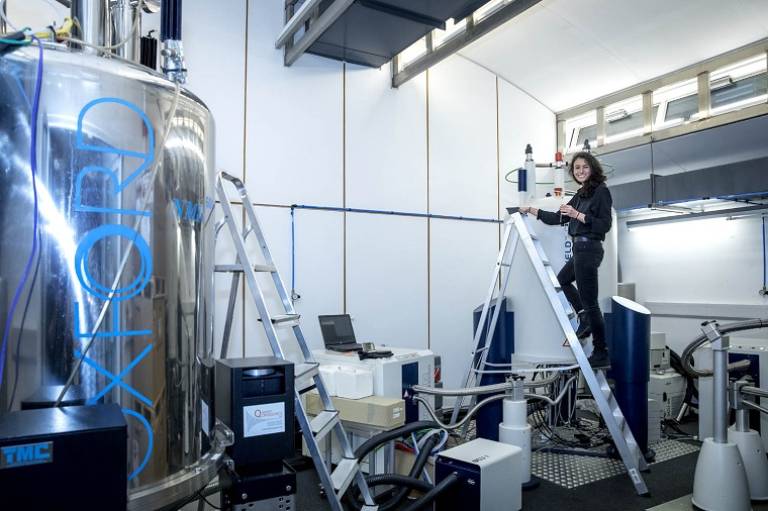New Tools to Study Disordered Proteins and Their Interactions with Small Molecules
29 March 2023
Dr Gabriella Heller, (Department of Structural and Molecular Biology, Division of Biosciences) has been newly appointed as BBSRC Discovery Fellow.

Dr Heller is set to develop new interdisciplinary tools to study biomolecules called disordered proteins and their interactions with small molecules. Her research aims to reveal the detailed molecular mechanisms through which these interactions occur, providing valuable insight into biological processes and how we can manipulate them towards the development of novel therapeutics for cancer, neurodegeneration, and diseases caused by viruses.
Many processes in biology depend on large biomolecules called proteins and how they interact with smaller chemicals or 'small molecules'. These interactions are often described in terms of a ‘lock-and-key’ binding, whereby small molecules (keys) fit snugly into ridges or groves on the protein surface (locks). While most proteins adopt well-defined 3D shapes associated with a specific function, many proteins, including those involved in human, viral, and plant biology, never adopt a single shape and instead rapidly interconvert between many shapes. These proteins, called 'disordered proteins', lack long-lived ‘locks’ to which small molecule ‘keys’ can bind, making them difficult to target using traditional methods.
Dr Heller's research aims to develop new experimental and computational tools to overcome the limitations of existing techniques and provide new insight into the molecular mechanisms of how disordered proteins interact with small molecules. Dr Heller will use an experimental technique called Nuclear Magnetic Resonance spectroscopy (NMR), in which strong magnetic fields are used to study the physical and chemical properties of proteins and small molecules. Dr Heller will combine NMR with a computational approach called molecular dynamics simulations to create 'movies' that reveal how small molecules and disordered proteins interact with one another, providing valuable insight that cannot be obtained from NMR alone.
Dr Heller said: “I’m thrilled to be starting as a BBSRC Discovery Fellow at University College London (UCL) which will enable me to combine my experimental and computational skills to develop new tools to study disordered proteins and their interactions with small molecules. Because disordered proteins lack traditional binding pockets for small molecules, they are often considered to be ‘untargetable’. However, disordered proteins can indeed bind small molecules, but the mechanisms of these interactions remain elusive and differ from ‘lock-and-key’ binding. The major bottleneck to fully understanding these binding events is the lack of available biomolecular techniques suitable for detection and characterisation. As a BBSRC Discovery Fellow, I will develop approaches to enable both myself and others to reveal the detailed molecular mechanisms through which disordered proteins interact with small, drug-like molecules towards the development of new therapeutics.”
Dr Heller completed her MPhil degree in the Department of Chemistry at the University of Cambridge and her PhD as a Gates Cambridge Scholar. She was previously a Rosalind Franklin Research Fellow at Newnham College, Cambridge, and a Schmidt Science Fellow at UCL, where she learned new experimental skills in NMR working with Professor D. Flemming Hansen. Dr Heller is now excited to begin her independent research career at UCL as a BBSRC Discovery Fellow, combining her computational and experimental skills to develop new tools to study disordered proteins and their interactions with small molecules.
Further information:
- Dr Gabriella Heller staff profile
- BBSRC Press Release link: BBSRC announces 22 New Discovery Fellows https://www.ukri.org/news/bbsrc-announces-22-new-discovery-fellows/
 Close
Close

